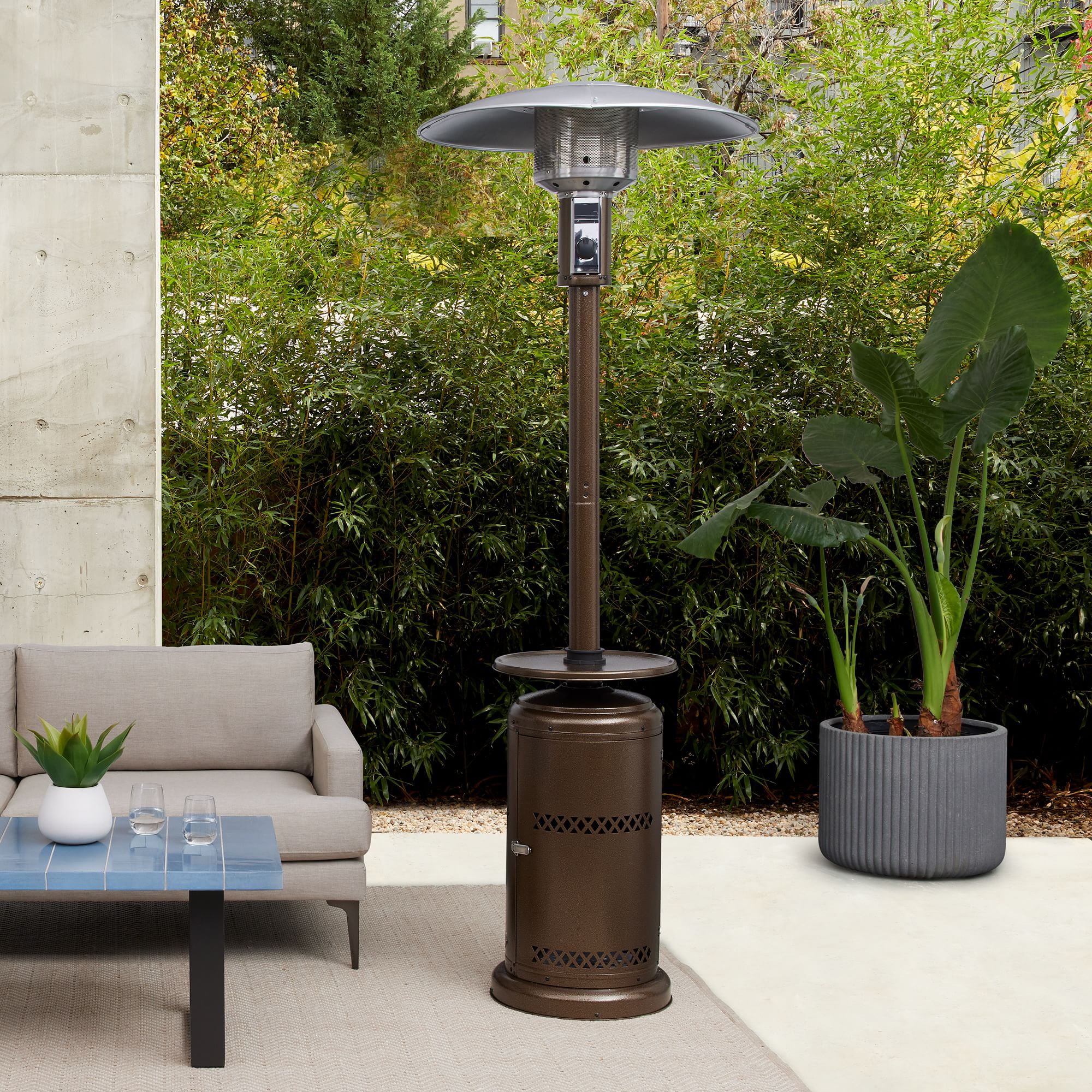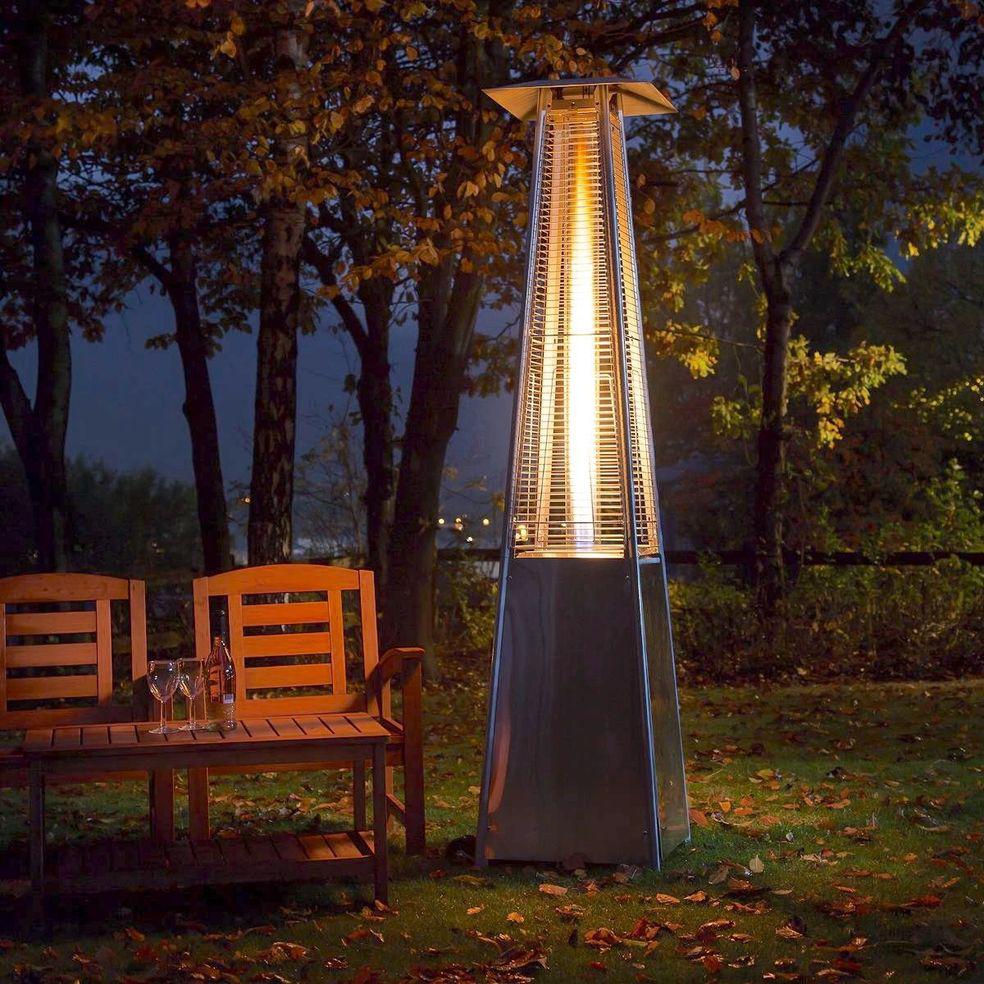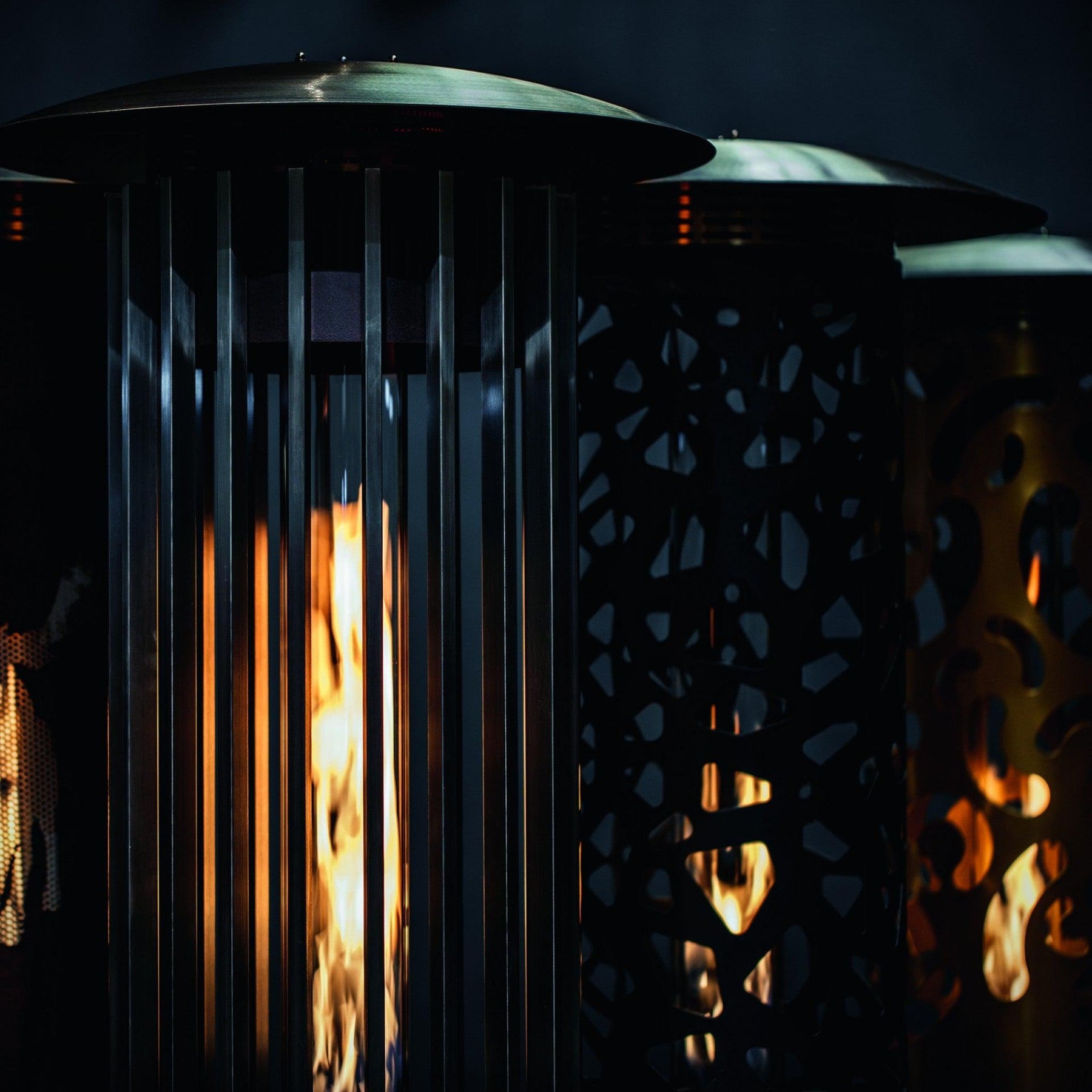A Beginner's Guide to Outdoor Gas Heaters
If you're someone who loves spending time outdoors but hates the chill of winter or the coolness of fall evenings, then an outdoor gas heater is definitely for you. Outdoor Gas Heaters are an excellent way to extend your outdoor entertaining season, as they provide warmth and comfort, allowing you to enjoy your time outside even in the cooler months. They can add ambiance to your patio, deck, or backyard and make your outdoor living space more enjoyable for you and your guests. In this beginner's guide, we will discuss everything you need to know about outdoor gas heaters.

How Do Outdoor Gas Heaters Work?
Outdoor gas heaters work by using a gas burner to heat up a metal or ceramic heating element, which then radiates heat to the surrounding area. The basic components of an outdoor gas heater include a gas line, a gas valve, a gas burner, a heating element, and a reflector. Here's how it works:
1. Gas Line. The gas line connects the outdoor gas heater to the gas source, which can be either a natural gas line or a propane/butane gas tank.
2. Gas Valve. The gas valve controls the flow of gas to the gas burner. The valve can be adjusted to increase or decrease the heat output of the heater.
3. Gas Burner. The gas burner is where the gas is ignited to produce heat. The burner is usually made of stainless steel and is designed to distribute the gas evenly for efficient heating.
4. Heating Element. The heating element is usually made of metal or ceramic and is located above the gas burner. As the gas burner heats up the heating element, it radiates heat to the surrounding area.
5. Reflector. The reflector is a metal plate located behind the heating element that reflects heat towards the surrounding area. The reflector also helps to prevent heat loss.
When the gas valve is opened, gas flows through the gas line to the gas burner, where it is ignited by a spark or a pilot light. The gas burner heats up the heating element, which then radiates heat to the surrounding area. The reflector helps to direct the heat towards the desired area, making outdoor gas heaters an efficient way to heat outdoor spaces.
Some outdoor gas heaters also come with additional features such as automatic shut-off valves, tilt sensors, and thermostats. These features help to improve safety and convenience, making outdoor gas heaters a popular choice for outdoor heating.

Fuel Type Options for Outdoor Gas Heaters
When it comes to outdoor gas heaters, there are different fuel types to choose from. The most common fuel types are natural gas, propane, and butane gas. Each fuel type has its own advantages and disadvantages, which can affect your decision when choosing an outdoor gas heater. Here's what you need to know about each fuel type:
1. Natural Gas
Natural gas is a popular choice for outdoor gas heaters because it is an affordable and efficient fuel source. Natural gas heaters require a natural gas line to be installed, which can be costly if there isn't already a line in place. However, once the gas line is installed, natural gas heaters are easy to operate and require little maintenance. They also produce less carbon emissions compared to propane or butane gas heaters, making them a more environmentally friendly option.
2. Propane
Propane is a readily available fuel source, making it a popular choice for outdoor gas heaters. Propane heaters are easy to install and operate, and they provide instant heat. They are also portable, making them a convenient option for outdoor spaces. However, propane tanks need to be refilled or replaced regularly, which can be inconvenient and costly. Propane heaters also produce more carbon emissions compared to natural gas heaters.
3. Butane Gas
Butane gas is a clean-burning fuel source that is commonly used in portable outdoor gas heaters. Butane gas heaters are lightweight and portable, making them an ideal option for camping or outdoor events. However, butane gas heaters require a separate gas canister to operate, which needs to be refilled or replaced regularly. Butane gas heaters also produce more carbon emissions compared to natural gas heaters.

Types of Outdoor Gas Heaters
There are different types of outdoor gas heaters available in the market, and each has its benefits and limitations. The most common types of outdoor gas heaters are:
1. Freestanding Heaters
These heaters are perfect for large outdoor spaces and are designed to stand on their own. They have a tall pole with a heating element at the top and a base that provides stability. They can be moved around easily and are perfect for outdoor entertaining.
2. Tabletop Heaters
These heaters are smaller in size and are designed to sit on a table or other flat surfaces. They are perfect for smaller outdoor spaces and can provide heat to a small group of people.
3. Wall-mounted Heaters
These heaters are fixed to a wall or other flat surfaces and are perfect for small outdoor spaces. They are designed to provide heat to a specific area and can be adjusted to direct heat where it is needed.
4. Portable Heaters
These heaters are smaller in size and can be moved around easily. They are perfect for camping or outdoor activities and can be fueled by propane or butane.

Safety Tips for Using Outdoor Gas Heaters
While outdoor gas heaters are generally safe to use, there are some important safety considerations to keep in mind. Here are some tips to help you use your heater safely:
1. Ventilation. Make sure your outdoor space is well-ventilated. Outdoor gas heaters produce carbon monoxide, which is a colorless, odorless gas that can be dangerous in enclosed spaces.
2. Keep Away from Flammable Materials. Keep the heater away from flammable materials such as curtains, paper, or plastic. Make sure there is enough space around the heater to prevent any fire hazards.
3. Stable Surface. Ensure that the heater is placed on a stable surface to prevent tipping over. Heaters should never be placed on an uneven surface or on a surface that can easily shift.
4. Keep Children and Pets Away. Children and pets should be kept away from the heater, as they may touch or play with it, leading to potential accidents.
5. Don't Leave the Heater Unattended. When using an outdoor gas heater, it's important to stay nearby and keep an eye on it. Don't leave it unattended for extended periods of time.
6. Follow the Manufacturer's Instructions. It's important to follow the manufacturer's instructions when using your outdoor gas heater. This will ensure that you're using it safely and effectively.
7. Check for Leaks. Before using your outdoor gas heater, check for any leaks in the gas line. If you detect a leak, turn off the gas and contact a professional to fix the issue.
8. Regular Maintenance. Regular maintenance of the heater is essential to ensure it is functioning correctly. Make sure to check the gas connections, hoses, and valves regularly. If you notice any worn or damaged parts on your outdoor gas heater, replace them as soon as possible to prevent further damage or safety issues. It's also a good idea to have your outdoor gas heater professionally serviced once a year to ensure that it's functioning properly and safely.

Tips for Installing Outdoor Gas Heaters
1. Read the Instructions. Always read the manufacturer's instructions before installation. The instructions will provide you with all the necessary information you need for safe installation.
2. Ensure Proper Ventilation. Outdoor gas heaters should be installed in a well-ventilated area to prevent carbon monoxide buildup.
3. Secure the Heater. Ensure that the heater is properly secured to prevent tipping over.
4. Professional Installation. The wall-mounted and natural gas heater should be better installed by a professional to ensure proper safety and installation.
Choosing the Right Outdoor Gas Heater
Choosing the right size of outdoor gas heater depends on the size of your outdoor space and the number of people you want to keep warm. Generally, a heater with a heat output of 40,000 BTUs can heat up to 20 feet in diameter and can keep 4-6 people warm. Here are some factors to consider when choosing the right size of outdoor gas heater:
1. Size of your Outdoor Space. The size of your outdoor space will determine the size of the heater you need. If you have a large outdoor space, a freestanding heater with a higher heat output will be perfect. If you have a smaller outdoor space, a tabletop or wall-mounted heater will work well.
2. Climate and Location. The climate of your area will also affect the size of the heater you need. If you live in a colder climate, you will need a heater with a higher heat output to keep you warm.
3. Number of People. The number of people you want to keep warm will also affect the size of the heater you need. If you are entertaining a large group of people, a larger heater will be required.
4. Style. Outdoor gas heaters come in a variety of styles, from sleek modern designs to more traditional-looking models. Consider the style of your outdoor living space and choose a heater that complements it.
5. Fuel Type. Outdoor gas heaters can run on either propane, natural, or butane gas. Propane is more portable, making it a good choice if you plan to move your heater around. Natural gas is more affordable but requires a gas line to be installed. Butane heaters are smaller and more compact than propane heaters, making them ideal for camping or other outdoor activities.
6. Features. Some outdoor gas heaters come with additional features, such as built-in lighting or a built-in table. Consider what features are important to you and choose a heater that meets those needs.
7. Price. Outdoor gas heaters can vary in price, with some models costing several hundred dollars or more. Set a budget for your heater and look for models that fit within that range.

Can I Use Patio Heaters in Restaurants and Hotels?
Gas patio heaters can be used in restaurants and hotels, and are often used to provide warmth and comfort for guests in outdoor dining areas or patio spaces. However, there are some safety regulations and guidelines that must be followed when using gas patio heaters in commercial settings.
In the United States, gas patio heaters are regulated by the Occupational Safety and Health Administration (OSHA) and must be installed and operated in accordance with OSHA standards. This includes proper ventilation to prevent the buildup of carbon monoxide, as well as following manufacturer instructions for safe installation and use.
In addition to safety regulations, there may be local building codes or zoning regulations that dictate how gas patio heaters can be used in commercial settings. It's important to check with your local authorities to ensure that you are in compliance with all applicable regulations.
When using gas patio heaters in restaurants and hotels, it's also important to consider the comfort of your guests. Make sure that heaters are placed in areas where they will provide the most warmth, and that they are not placed too close to seating areas or other flammable materials. It's also a good idea to choose a heater that is appropriate for the size of your outdoor space, to ensure that all guests are comfortable.

Why Invest in a Gas Patio Heater?
There are several reasons why investing in a gas patio heater can be a smart decision for homeowners, businesses, and anyone who spends time outdoors. Here are some of the top reasons to consider investing in a gas patio heater:
1. Extend your Outdoor Season. One of the main benefits of a gas patio heater is that it allows you to enjoy your outdoor space for longer periods of time, even during cooler months. With a gas patio heater, you can create a warm and comfortable environment that allows you to enjoy your outdoor space well into the fall and winter months.
2. Versatility. Gas patio heaters come in a variety of shapes, sizes, and styles, which means that you can find one that fits your specific needs and preferences. Whether you need a heater for a small patio or a large outdoor area, there is a gas patio heater that will work for you.
3. Easy to Use. Gas patio heaters are generally very easy to use, with simple controls that allow you to adjust the heat output as needed. Many models also come with safety features such as automatic shut-off, which ensures that the heater will turn off if it tips over.
4. Cost-effective. While gas patio heaters do require an initial investment, they can be a cost-effective way to heat your outdoor space over the long-term. Gas patio heaters are generally more affordable to operate than electric heaters, and they provide more heat output than wood-burning heaters.
5. Eco-friendly. Gas patio heaters are a more environmentally friendly option than wood-burning heaters, which can produce harmful emissions. While propane and natural gas do produce some emissions, they are generally considered to be cleaner-burning fuels than wood.
Outdoor gas heaters are a great investment for anyone who loves spending time outdoors, providing warmth and comfort during the cooler months. With a variety of styles and sizes available, you're sure to find one that meets your needs and fits your outdoor living space.

Patio Pelican’s Takeaways
Patio Pelican is proud to offer a wide range of outdoor gas heaters, including some of the top brands in the industry. Our selection includes models in various sizes and styles, so you can find the perfect heater to fit your specific needs and preferences.
We offer propane, natural, and butane gas patio heaters, giving you the flexibility to choose the fuel source that works best for you. Our heaters are designed to be both functional and stylish, so they can enhance the look of your outdoor space while providing the warmth and comfort you need.
We are committed to providing our customers with high-quality products and excellent customer service. Whether you are a homeowner looking to create a warm and inviting outdoor space, or a business owner looking to provide a comfortable environment for your guests, we have the products and expertise to help you achieve your goals.
If you're interested in learning more about our COLLECTION OF OUTDOOR GAS HEATERS, or if you have any questions about outdoor heating systems in general, please don't hesitate to contact us. Our team of experts is always available to help you find the perfect heating solution for your needs.






